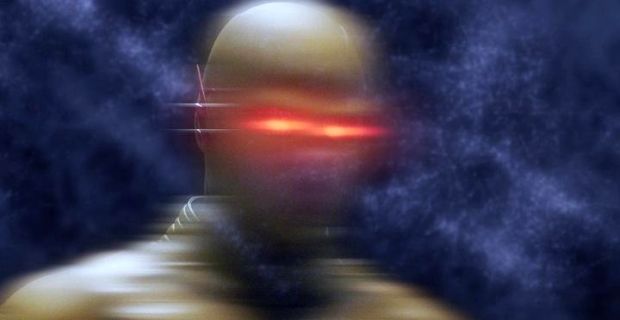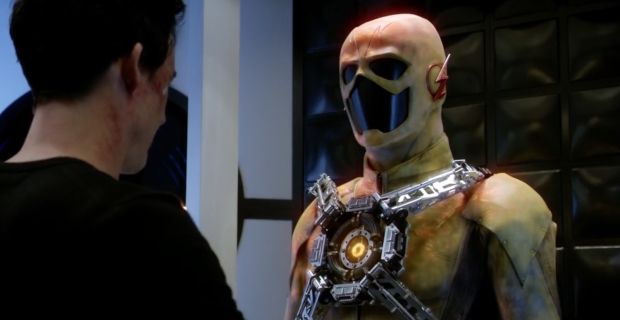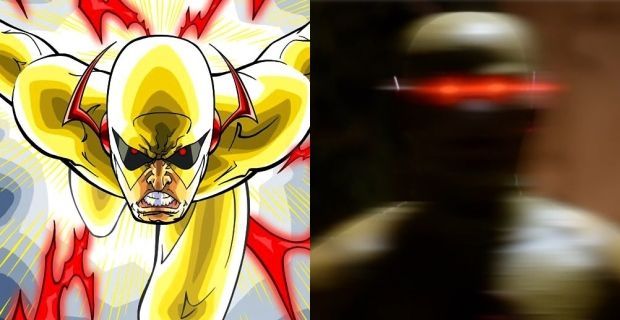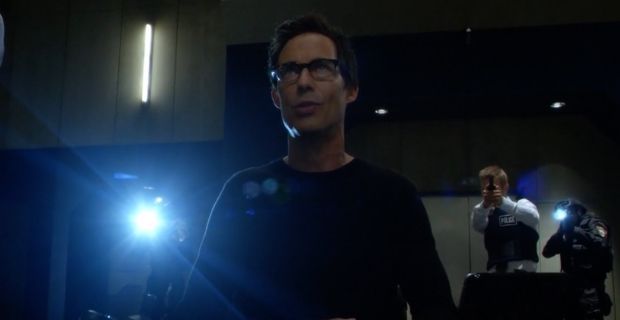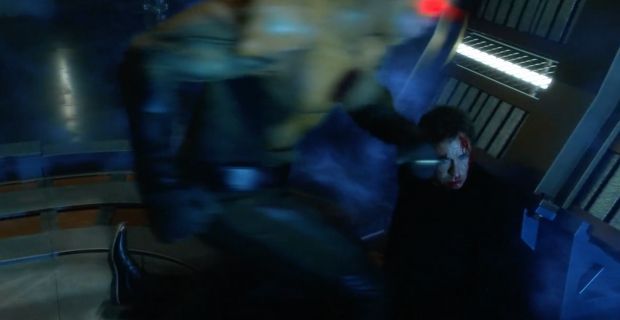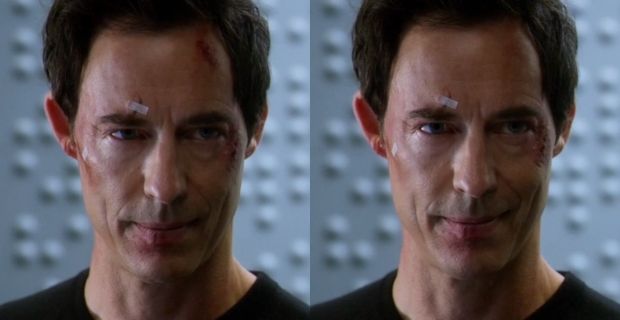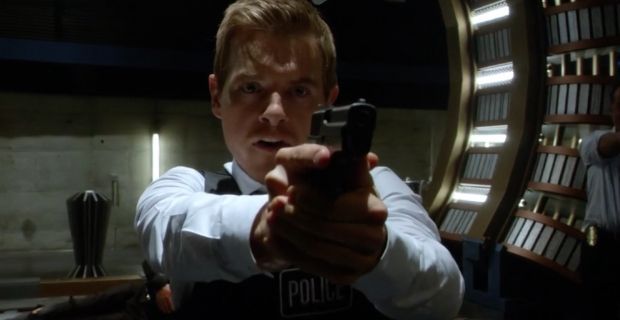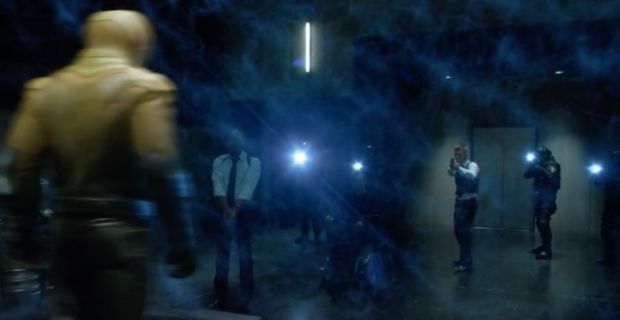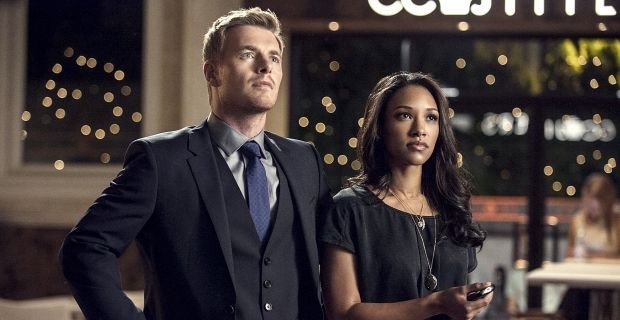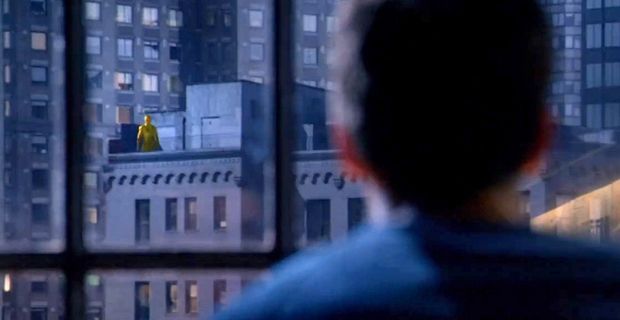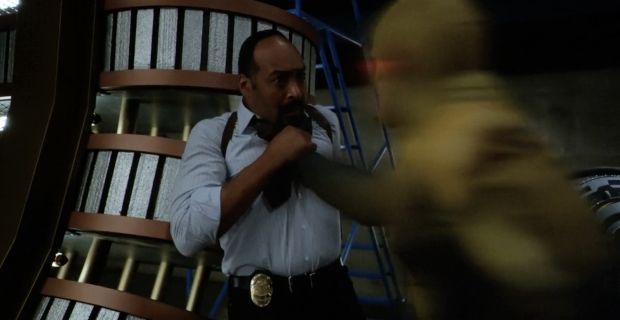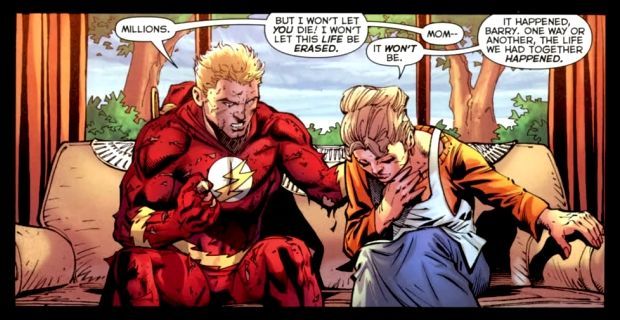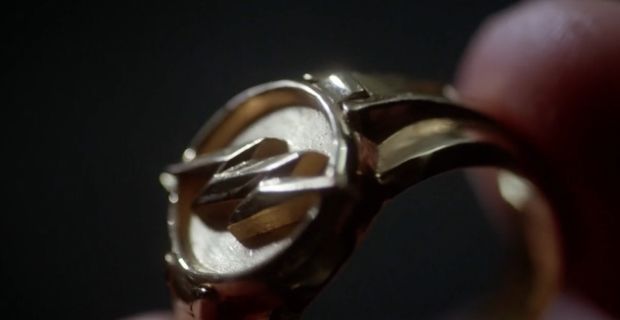[This article contains SPOILERS for The Flash Season 1!!]
-
Comic book fans didn't have to wait long to see The Flash trade blows with his iconic arch-nemesis - dubbed the Reverse-Flash - with the mid-season finale ushering in the villain's arrival. The show's first episode confirmed it was 'The Man in Yellow' who sent Barry Allen (Grant Gustin) on his current path by murdering his mother and framing his father.
Now that the yellow speedster has admitted as much (claiming that Nora Allen's death, like Barry's loss to this superior speedster, was destined to happen) one mystery remains: Who is it under the yellow mask?
Stories hinging on time travel tend to get murky fast, and The Flash is no exception. But assuming that the show's writers have had a plan in place since the start - which they claim - we've outlined the various possible answers and theories. Check them out below, and see which seems like the most likely.
-
What We Know
The show's writers made it clear that Dr. Harrison Wells (Tom Cavanagh) was up to something from the very start: with knowledge of the future and a desperate need to ensure Barry Allen reaches his potential - at any cost. Given that, it wasn't entirely shocking to see the mid-season finale conclude with the yellow suit in his possession. And since he's lying about being able to walk, casual viewers will take the scene at face value.
The other notable facts begin with the purpose of Mercury Labs' tachyon technology. Once placed onto the suit, the mysterious 'prototype' appears to be spreading some sort of energy across its surface; the implication being that the suit may be blessed with a power or energy, not necessarily the person wearing it. And a fancy suit fails to explain every memorable feature of 'The Man in the Yellow Suit.'
The decades-long history of the Reverse-Flash may or may not be relevant to this version, but we'll simply remind viewers that the title most often refers to not one, but two different villainous speedsters. The first being Eobard Thawne, a scientist from the 25th Century who envied the Silver Age Flash, replicating the disaster that granted Barry Allen his powers. As a new speedster, Thawne's experiments with time travel brought him in contact with Barry, ultimately the source and target of his hatred. As revenge - under writer Geoff Johns' direction - Thawne went on to torment Barry throughout his life, including killing his mother.
But it's just as worthwhile to point out Hunter Zolomon, friend and fellow policeman to Wally West, Barry Allen's successor. When Zolomon winds up injured and confined to a wheelchair, he requests that Wally travel back in time to spare his legs. Wally refuses, leading Zolomon to attempt the feat himself. The result: Zolomon was removed from the timestream, and left with a serious grudge against The Flash. Blessed with glowing red eyes, a personal connection to The Flash, and an ability to move through time, not just space, Zolomon proved every bit as deadly as his predecessor.
Viewers of The Flash can likely see both story lines potentially at play in the show so far, and while the confirmed aspects of time travel (or at least glimpses into the future) confuse the possibilities, both versions of the villain could offer insight into just what surprises the showrunners are building toward.
-
Dr. Harrison Wells
Although the casting of 'Detective Eddie Thawne' threw up red flags for comic readers, it's been Dr. Harrison Wells at the center of suspicion since episode one. Being shown willing to kill, lie, spy and manipulate Barry into becoming 'a better hero,' Wells has followed Thawne's playbook closely. Add in teases of a missing past, and a strangely personal connection to 'The Flash' - not Barry - and, well, if the yellow suit fits...
Some have theorized that Wells is, in fact, a future Thawne having travelled back in time to build Barry into the hero he's destined to become (or the hero he needed to be to prevent a massive 'crisis'). While that's entirely possible given the comic book history - and Geoff Johns' claim that The Flash is DC's most faithful adaptation ever - one problem persists: Wells knows what the future holds, but that's thanks to a future newspaper, not personal experience.
The mid-season finale including a fight scene between the Reverse-Flash and Dr. Wells complicates things further. Theorists can argue elaborate misdirections, or a future version of Dr. Wells that shifts to more direct means of manipulating events (if he really is a speedster, then a mirage hiding the fact that he's inflicting wounds on himself would be just as possible). But given that his role as villain is almost too obvious at this point, we would argue that he's exactly as he seems.
Could viewers of the finale's last scene be witnessing not a reveal of the Reverse-Flash's identity, but the creation of the speedster's suit at the hands of Dr. Wells? Then how would that explain his chilling "Merry Christmas" in the Reverse-Flash's voice? Or the fact that the wounds on his face heal before viewers' eyes - but only once the tachyon machine began to run?
If Harrison Wells is as brilliant a tactician as implied, then it seems more likely he'd rely on another character to do his dirty work in molding Barry's character through suffering...
-
Detective Eddie Thawne
It's hard to call this theory a surprise, since the writers knew exactly what they were revealing when adding 'Eddie Thawne' (Rick Cosnett) to their cast. Eddie may have been introduced as a romantic rival, or egotistical cop in The Flash's first episode, but has defied expectations ever since. Portrayed as a well-meaning detective and an eager friend to Barry Allen, a villainous turn has seemed like a long shot. Until recently.
With Eddie's sudden distrust of Central City's guardian blur, there's no question he'll feel betrayed if The Flash's true identity is revealed - by both Barry and his partner, Joe (Jesse L. Martin). Now that Barry has made his true feelings for Iris (Candice Patton) clear, it's also possible to see a future in which Eddie loses the woman he loves, and his faith in his friends. If the circumstances are traumatic enough, that's grounds for revenge.
The show's interest in time travel means that fans won't have to wait around and watch as Eddie becomes the Reverse-Flash - he may be wearing the suit already. Or, a future version of himself, that is (hence why Reverse-Flash may have spared Eddie without a scratch: he can't kill his past self).
It's hard to believe that any hurt feelings or betrayal would push a man like Eddie to hunt down and kill an innocent woman, unless the traumatic transformation that waits in his future is tied directly to a decision made by Barry. If The Flash is forced to choose between Eddie and Joe (we all know how that would go) and leaves his romantic rival permanently scarred, is that grounds for vengeance? It could be, if Eddie suspects Barry's feelings for Iris played a part.
Thanks to the science fiction trope of 'time loops,' Eddie is already aware of the most painful experience in Barry's life. If a bruised, broken, and betrayed Eddie was approached by a wheelchair-bound doctor, and told that vengeance isn't just possible - but destined to occur - would Eddie refuse? What if the yellow suit that makes it possible to beat Barry at his own game was offered as well?
Besides blending both Barry and Wally's versions of The Flash (something apparently already under way), this reveal would make Eddie as a villain a character that audiences could actually sympathize with. Eddie has been content to do his job to this point, so becoming a victim - to both Barry's decision-making and Dr. Wells' larger scheming - would carry weight, not simply drop fans' jaws.
-
Barry Allen
It was a theory dismissed just as quickly as it appeared by many viewers and comic fans: that the Reverse-Flash - or Harrison Wells - was actually Barry Allen from the future. As far as time travel mysteries go, the theory seemed heavily flawed from the outset. While we won't necessarily bet the farm on Barry being the man in yellow, it almost seems too intriguing a possibility to ignore.
To even entertain this idea, the nature of the time loop being implied by almost all fan theories must be pinned down. Essentially, that someone in the current cast of characters - Wells, Thawne, or Captain Singh - will one day become the Reverse-Flash, and travel back in time to kill Barry's mother and send him on his current path. The root of the problem is that in the universe of The Flash, those events have already happened.
In other words, a villain with the ability to rewrite history implies a version of Barry Allen whose mother wasn't killed could - and already did - exist. Can audiences be certain that a happy childhood for Barry would have been better for the world? Or that that version of Barry remained a hero?
In the mid-season finale, Cisco Ramon (Carlos Valdes) pointed out what many viewers spotted in the premiere episode: that there wasn't just a ball of yellow lightning surrounding Nora Allen when she was killed, but a red one as well. In other words, fans already know that a red speedster (presumably Barry) will one day attempt - and fail - to save his mother from her fate. Is it possible Barry doesn't fail, but merely comes to realize that his mother's life was the price of giving the world the hero it would ultimately need?
We would remind readers that the same 'man in yellow' removed Barry from harm's way before his mother was killed, and that the notion of Nora Allen's survival - and Barry's happier life - leading to more bad than good is pulled directly from the comics. Specifically, the "Flashpoint" series written by The Flash executive producer Geoff Johns.
In all honesty, it wouldn't make too much of a difference in the grand scheme of things if an alternate timeline's corrupted Barry Allen (as opposed to anyone else) decides Nora Allen's death must take place - if it's the "Flashpoint" road the writers intend to take. The real potential of such a decision would be what happens when Barry manages to stop the murder from happening. In short: he's no hero, with no link to Iris West, or a job with the CCPD.
Seeing killers go free because Barry's talents are focused outside of the crime lab or Joe West's life is a little bit darker would be difficult for viewers to see as an objectively 'better' result, and would make for an entertaining number of episodes somewhere down the line. Ultimately, Barry might realize that no matter how twisted the man in yellow may have been, he was right about one thing: the best Barry Allen is born from tragedy.
-
Conclusion
Those are just a handful of the possible theories we think might be at work in The Flash's first half-season, and it's possible that the writers are seeking a blend of all three. Star Grant Gustin has admitted that the actual plan took him entirely by surprise, so hopefully the fans will feel the same way.
The Flash returns to air on Tuesday, January 20 @8pm on The CW.
Follow me on Twitter @andrew_dyce for updates on The Flash as well as movie, TV, and gaming news.

